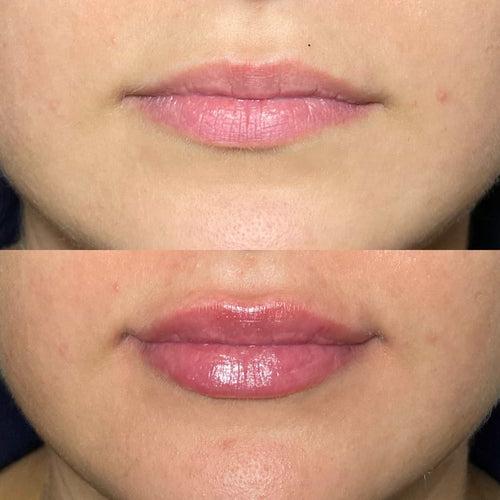Get Started with Dermal Fillers – Book with Dr. Laura Geige
Timing is Key
First 24-48 Hours: The No-Alcohol Zone
Timing is crucial when it comes to lip filler and alcohol consumption. The first 24-48 hours following your procedure are particularly important.
Here’s why:
-
Inflammation
-
Thinner Blood
-
Reduced Healing
Lip fillers cause minor swelling and inflammation as they integrate into the lips. Alcohol can exacerbate this inflammation, leading to more noticeable bruising and swelling.
Alcohol thins the blood, which can increase the risk of bleeding during and after the procedure. This could lead to uneven filler distribution or bruising.
Alcohol can interfere with your body’s natural healing processes. It’s important for your lips to heal properly to ensure optimal results from the filler.
Following a no-alcohol period of at least 24-48 hours after lip filler ensures:
-
Minimized swelling and bruising
-
Reduced risk of bleeding
-
Optimal healing and integration of the filler
-
Best possible aesthetic outcome
Always consult with your injector for specific advice regarding alcohol consumption after lip filler. They can provide personalized guidance based on your individual needs and medical history.
Following Your Practitioner’s Instructions
Timing is absolutely crucial when it comes to consuming alcohol after lip filler injections.
Here’s why:
1. **Increased Swelling and Bruising:** Alcohol can act as a blood thinner, potentially leading to increased swelling and bruising at the injection site. This can not only make your lips look uneven but also prolong the healing process.
2. **Impaired Healing:** Alcohol can interfere with your body’s natural healing mechanisms. It can slow down tissue repair and increase the risk of complications like infection.
3. **Medication Interactions:** Some people might be taking medications, prescribed or over-the-counter, that interact negatively with alcohol. Combining alcohol with these medications, especially after a medical procedure like lip filler injections, could have unpredictable and potentially harmful effects.
4. **Dehydration:** Alcohol is a diuretic, meaning it can lead to dehydration. This can worsen the dryness and discomfort that’s common in the initial days after lip filler treatment.
5. **Compromised Immune System:** Alcohol consumption can temporarily weaken your immune system, making you more susceptible to infections.
Your practitioner will provide specific instructions regarding alcohol consumption after your lip filler treatment. It is essential to follow these guidelines meticulously for the best possible results and to minimize any potential risks.
Potential Complications to Consider
Swelling and Bruising Exacerbated
Alcohol consumption after lip filler injections can potentially complicate the healing process and increase the risk of adverse effects.
Here are some potential complications to consider:
- Increased Swelling and Bruising:
- Delayed Healing:
- Increased Risk of Infection:
- Altered Filler Results:
Alcohol consumption may affect the distribution and absorption of filler material in the lips. This could lead to uneven results, migration of the filler, or a less desirable aesthetic outcome.
- Interaction with Medications:
If you are taking medications, alcohol may interact with them, potentially increasing side effects or reducing their effectiveness. It’s crucial to consult your doctor about any potential interactions before consuming alcohol after lip fillers.
Alcohol is a vasodilator, meaning it widens blood vessels. This can exacerbate swelling and bruising, which are common side effects after lip fillers. The increased blood flow may also make the filler appear more pronounced or uneven.
Alcohol can impair the body’s natural healing processes by suppressing the immune system and slowing down cell regeneration. This can prolong the time it takes for your lips to fully recover after filler injections.
Alcohol can weaken the immune system, making you more susceptible to infections. Any punctures or trauma from the needle used for lip fillers can provide an entry point for bacteria, increasing the risk of infection if your body’s defenses are compromised.
It is generally recommended to avoid alcohol for at least 24-48 hours after receiving lip filler injections to minimize the risk of complications and ensure proper healing.
Increased Risk of Infection
Drinking alcohol after lip fillers can increase the risk of complications due to its dehydrating effects.
Alcohol can thin your blood, leading to increased bleeding and bruising at the injection site. This can make it more difficult for the filler to settle properly and may prolong swelling and discomfort.
Alcohol can also suppress your immune system, making you more susceptible to infections. This risk is especially important to consider after any invasive procedure like lip fillers, as the puncture wounds create entry points for bacteria.
Inflammation caused by alcohol consumption can exacerbate swelling and redness associated with lip filler treatment.
Book a Dermal Filler Session with Dr. Laura Geige Now
It’s essential to prioritize your body’s healing process and minimize the risks of complications.
Arrange a Dermal Filler Consultation with Dr. Laura Geige Today
Impaired Healing Process
Alcohol can significantly impair the healing process after lip filler injections.
Here are potential complications to consider:
-
Increased Swelling and Bruising:
-
Alcohol is a vasodilator, meaning it widens blood vessels. This can lead to increased swelling and bruising around the injection site.
-
Elevated Blood Pressure:
-
Alcohol consumption can raise blood pressure, which may interfere with proper blood flow to the treated area, hindering healing.
-
Thinner Blood and Increased Bleeding:**
-
Alcohol thins the blood, making it more likely to bleed. This could result in excessive bleeding during or after the procedure, increasing the risk of complications.
-
Delayed Healing:
-
Alcohol can suppress the immune system and slow down cell regeneration, both essential for proper wound healing.
-
Infection Risk:
-
Weakened immune function due to alcohol consumption can make you more susceptible to infections at the injection site.
-
Altered Results:
-
Alcohol’s effects on blood flow and swelling could potentially distort the desired shape or symmetry of the lip filler results.
It is crucial to abstain from alcohol for at least a few days before and after your lip filler appointment to minimize these risks and ensure optimal healing.
Long-Term Effects on Lip Filler Results
Delayed Absorption
Lip fillers are a popular cosmetic treatment that can enhance lip shape, size, and volume. However, like any medical procedure, it’s important to understand the long-term effects and potential complications.
One factor influencing long-term results is delayed absorption of the filler material. Unlike other injectables that dissolve relatively quickly, some fillers, particularly hyaluronic acid-based ones, can persist for months or even years.
This prolonged presence means the effects of lip fillers tend to last longer, with touch-up appointments typically required every 6 to 18 months depending on the individual’s metabolism and filler type. However, delayed absorption can also lead to unforeseen consequences if not carefully managed.
Here’s a breakdown of potential long-term effects associated with delayed absorption:
• **Asymmetry or Irregularity:** Over time, fillers may be absorbed unevenly, leading to an asymmetrical or irregular appearance. This highlights the importance of using experienced injectors who pay close attention to symmetry during the procedure.
• **Lumps and Bumps:** Delayed absorption can cause filler to accumulate in certain areas, forming lumps or bumps that are visually undesirable. Careful massage techniques after injection and avoiding excessive sun exposure can help minimize this risk.
• **Vascular Complications:** Although rare, prolonged presence of filler near blood vessels could theoretically increase the risk of vascular complications, such as blockage or damage. It’s crucial to choose a qualified injector who understands the anatomy of the face and avoids injecting near major blood vessels.
• **Scarring:** While not directly caused by delayed absorption, prolonged inflammation due to filler migration can potentially lead to scar formation in some individuals.

To minimize these risks, it’s essential to consult with a qualified and experienced injector. Discuss your expectations, medical history, and any concerns you may have about long-term effects. Regular follow-up appointments are also crucial to monitor the results and address any issues promptly.
Remember that lip fillers are a temporary solution. They require maintenance and ongoing care to ensure optimal and safe results over time.
Weakened Filler Integrity
While alcohol isn’t inherently bad for lip filler results, its consumption after treatment can have some long-term effects on the longevity and integrity of the filler.
Here’s how alcohol might impact your lip filler over time:
-
Increased Inflammation: Alcohol is known to be an inflammatory substance. Following lip filler treatment, your lips are already undergoing a minor inflammatory process as they adjust to the filler. Consuming alcohol can exacerbate this inflammation, potentially leading to swelling, bruising, and discomfort that may delay healing.
-
Dehydration: Alcohol is a diuretic, meaning it increases urine production, which can dehydrate you. Dehydration can negatively impact your skin’s elasticity and plumpness, making the filler less effective over time.
-
Weakened Filler Integrity: Alcohol can affect collagen production, a protein crucial for maintaining skin structure and support. Reduced collagen levels might cause the filler to break down faster, resulting in a shorter lifespan for your lip enhancement.
-
Blood Thinning Effects: Alcohol consumption, even in moderation, can thin the blood. This can increase the risk of bruising and bleeding after the procedure, potentially affecting the placement and appearance of the filler.
It’s important to remember that these are potential long-term effects. Your individual results may vary depending on factors like your metabolism, the type of filler used, and how much alcohol you consume.
For optimal lip filler results and to minimize any potential risks, it’s generally recommended to avoid alcohol for at least 24-48 hours following treatment.
Divine Magazine Kindra Mann Prince and Flower James Martin Live Pinnacle Wellbeing Media
